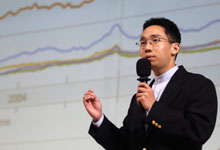大家都知道,我們的經濟要成長就需要人力,資本,及科技的進步。人和資本越多,就可以生產更多東西。但是邊際生產力會遞減,意味著到某種程度,若我們繼續投資人力與資本會不划算,因為每增加一單位的人力或資本所帶來的邊際收益會比邊際成本小。因此,到某依種程度經濟成長就停了.........除非.........科技進步。
Solow模型是經濟成長的代表模型,但他有一個問題,科技進步在這模型內是外生變數,意思就是科技進步是上帝給的。但顯然的,這是錯的。若真是如此,為何每年一堆公司都將人力及資本投入在R&D上? 若要建立一個具有說服力的模型,必須將"科技進步"納入模型內,成為內生變數。這問題從經濟學之父,亞當史密斯開始就一直使經濟學家徹夜難眠。直到16年前才有解答。
Paul Romer在1990年的論文"Endogenous Technological Growth"將這個問題解決了。也使他一夕之內成為家喻戶曉的名人(至少在經濟學家的家內)。近幾年來,他得諾貝爾獎的呼聲非常高。以下節錄一段Paul所寫的:
"Economic growth occurs whenever people take resources and rearrange them in
ways that are more valuable. A useful metaphor for production in an economy
comes from the kitchen. To create valuable final products, we mix inexpensive
ingredients together according to a recipe. The cooking one can do is limited by
the supply of ingredients, and most cooking in the economy produces undesirable
side effects. If economic growth could be achieved only by doing more and more
of the same kind of cooking, we would eventually run out of raw materials and
suffer from unacceptable levels of pollution and nuisance. History teaches us,
however, that economic growth springs from better recipes, not just from more
cooking. New recipes generally produce fewer unpleasant side effects and
generate more economic value per unit of raw material.""Every generation has perceived the limits to growth that finite resources and undesirable side effects would pose if no new recipes or ideas were discovered. And every generation has underestimated the potential for finding new recipes and ideas. We consistently fail to grasp how many ideas remain to be discovered. Possibilities do not add up. They multiply.”
有獎徵答: 清華大學有一位經濟系的老師是Paul Romer所指導的學生,請問是誰?
提示: Paul Romer之前在 University of Rochester 教書。
答對的人我就送這本書給他

No comments:
Post a Comment